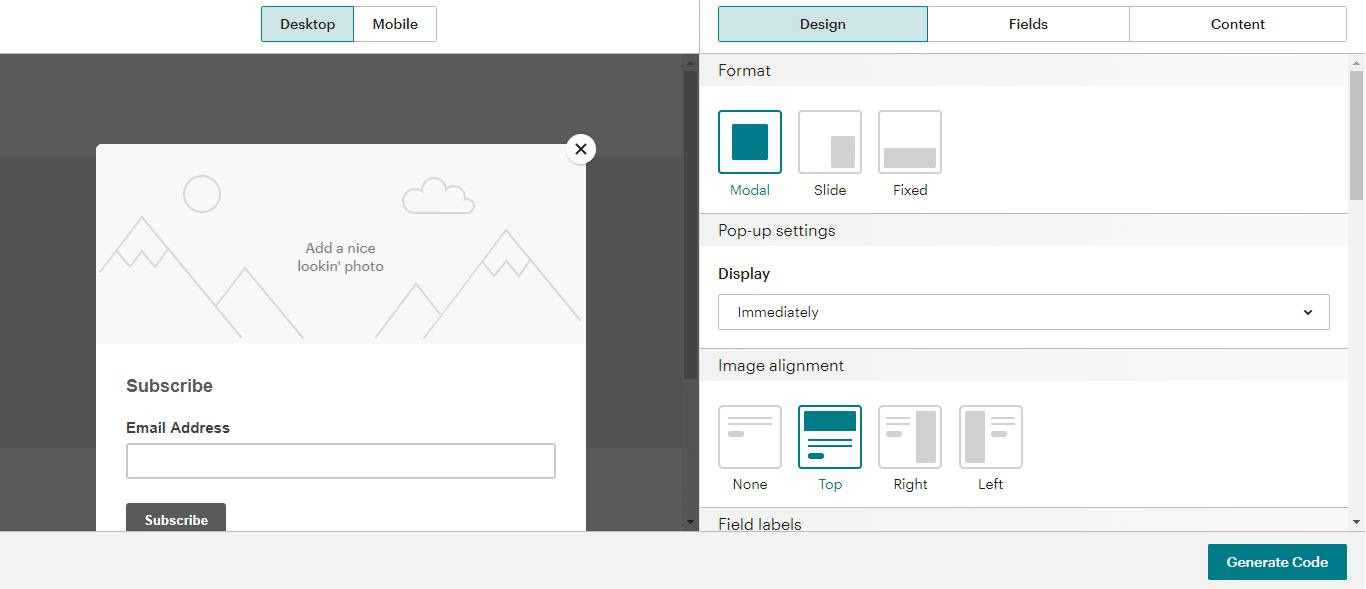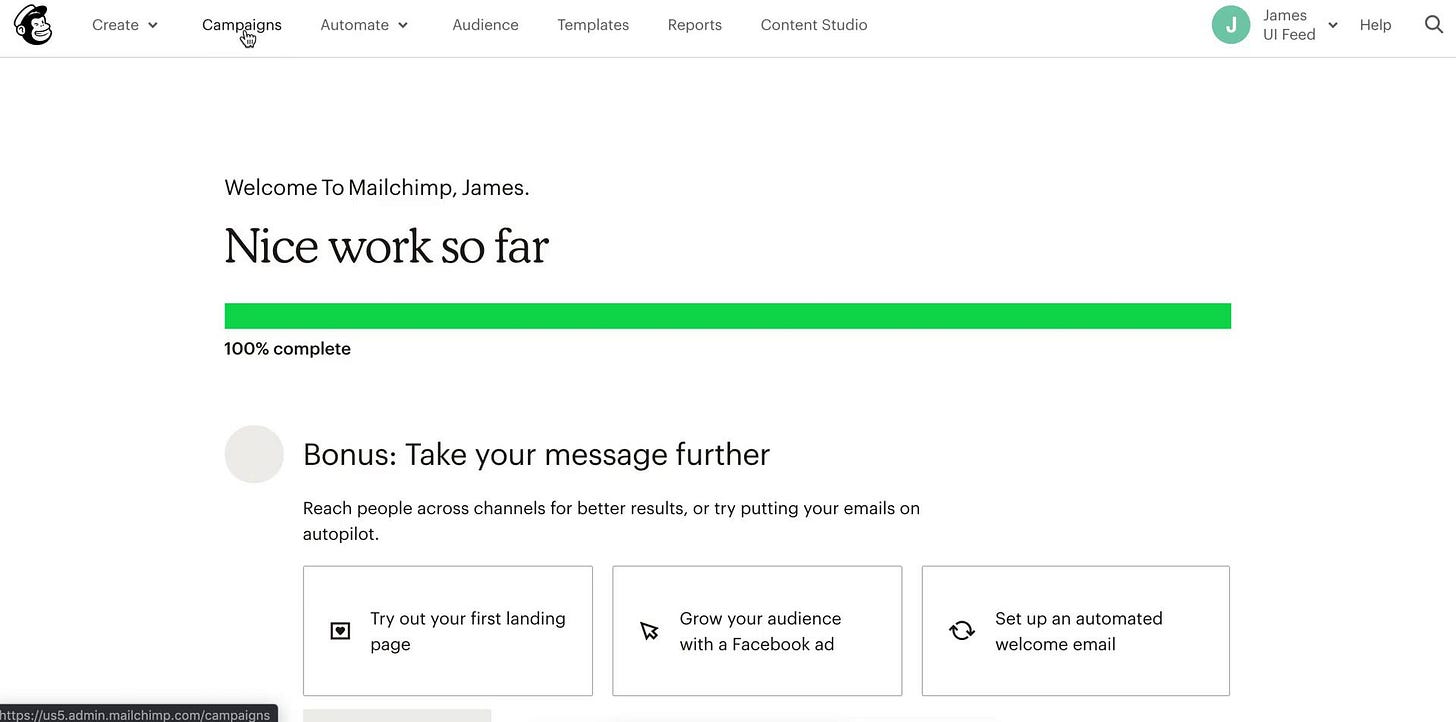Mailchimp - a $12Bn worth of simple emails
The power of simplicity, and why boring is interesting!
I’ve been dormant on this newsletter for about a year or so — have had the itch several times, but between work and kids, you know the drill. Anyway, I wanted to pivot the newsletter a bit and focus on business tools or products I’m curious about and maybe some I may have used in the past and see what we can learn from them. Let me know what you think!
Mailchimp's famous winking chip logo
What is their Origin Story?
Mailchimp is a fascinating case study. To start with, the founders Ben Chestnut and Mark Armstrong didn't start the company in Silicon Valley but instead in Atlanta, which didn't have much of a tech presence in 2001 when Mailchimp started. They started as a side hustle for their e-greetings website, the timing was perfect (email was taking off, Gmail launched in 2004), and the service immediately took off. Surprisingly, Mailchimp stayed bootstrapped and profitable, until it was acquired by Intuit for $12B in 2021. Some great content about their origin story is available in this Forbes article and this episode of Guy Raz's How I built this.
What is the Product?
At its heart, Mailchimp is a pretty simple product. It lets you manage lists of customers, and run email campaigns for them. It's focused on small businesses - and is often one of the first things a new business will set up since email ROI continues to remain high. It's provided on a freemium model - you get up to 2000 contacts free, and then start paying more based on the list size (interestingly, it's not based on email volume).
One of the reasons the product has been super successful is that it is extremely easy to use. The email builder and templating system are super easy to use, and the tool does a great job of explaining how to get more distribution. There's easy-to-understand tracking, analytics, subscription, and list management. For those who were involved with email marketing in the early 2010s, getting an email delivered into somebody's inbox was challenging (spam rules, etc.) - and MailChimp was pretty good at it. I would guess that was one of the big reasons why it took off!
Super-simple email template builder
However, as Mailchimp evolved they realized that they need to go upstream and add additional capabilities to help their customers succeed. Some examples:
They have built-in landing pages, email capture forms including opt-ins and double opt-ins, and the ubiquitous one-line email subscription entry point those businesses can integrate into their website [At my previous startup, we didn't use the forms/entry points directly, instead used purpose built software that we then integrated with MailChimp for email]
Mailchimp also lets people automatically publish to social media (including adding og: tags), sync audiences, even create lookalike audiences on Google and Meta's ad platforms.
They integrate with a lot of website marketing platforms like sumo.com and segment.com - they are often the first tool that many of these platforms integrate with providing the backend audience management capabilities
They have added interesting segmentation capabilities - both simple ones built-in, as well as the ability to import segmentation information from other tools. You could build pretty sophisticated drip campaigns purely using Mailchimp -- in that sense, it helps achieve their vision of a marketing automation platform for small businesses. [I can personally speak to that, having run sophisticated drip marketing campaigns purely using MailChimp]
There's a bunch of things around better creatives and copy (including a subject line optimizer) - since that's so essential to increasing audience interest, open, click, and response rates
They also added enterprise offerings like Mandrill (transactional email gateway) but I would guess that Sendgrid and Twilio are far ahead of them
Lots of focus on audience building
In more recent times, Mailchimp has been aggressively adding more capabilities to grow its ecosystem. They launched their e-commerce stores for both products as well as services. They have also recently announced capabilities for booking appointments, as well as integration with Shopify -- this helps automatically add people who purchase as subscribers, and sync orders so that businesses can build smarter audiences using transactional information.
What do customers say?
Some sample quotes that I saw online at G2.com
Simple UI:
"I love the UI! It's beautiful, intuitive, and easy to use. I've never had a problem finding anything or figuring out how to do something. The design templates for HTML emails are wonderful, too!"
All in one platform:
"To promote a business, this tool provides all of the necessary marketing channels. We can add your audience to an Excel spreadsheet and then begin delivering emails to them."
Helps small businesses stay abreast of new technology:
"Mailchimp combined with YouTube allows us to share videos with our clients without directing them to other apps or software. With a diverse age range including many older folks, anytime an email has to redirect to another app, some are confused or unable to use it. The ability to watch a video within the email resolves this problem." (sic)
It gets costly pretty quickly:
"As they add more features, I feel like their core offering of email marketing suffers. It's gotten much more complicated and much more pricey."
What size are they at?
I found a 2019 article that talked about having 11M businesses with a total audience of 4 Billion and was on track for $700M in revenues. Their email volume is huge - In 2014, they were sending out 10 billion emails per month.
In September 2021, Intuit announced plans to acquire it for $12B in cash and stock. The acquisition was completed in Nov 2021.
What can we learn from Mailchimp?
Simple is Beautiful. Mailchimp's UI is super simple and easy to use for small businesses (I know it - I helped my aunt set it up!) - there's immense power in this simplicity, and it is not easy to make things both simple and sophisticated
The Power of an Ecosystem. As the marketing automation ecosystem got established with players like segment and others, Mailchimp had open APIs and was the first port of call for many of them as it pertains to the system of record for marketing.
Boring is interesting. Mailchimp maintained a single-minded focus on email and making it easy for businesses to use, and email remains one of the most valuable marketing channels for brands.
If you've read thus far, thank you! I would love your feedback.





We've been using Hubspot and I must say that sometimes I look at Mailchimp hungrily.